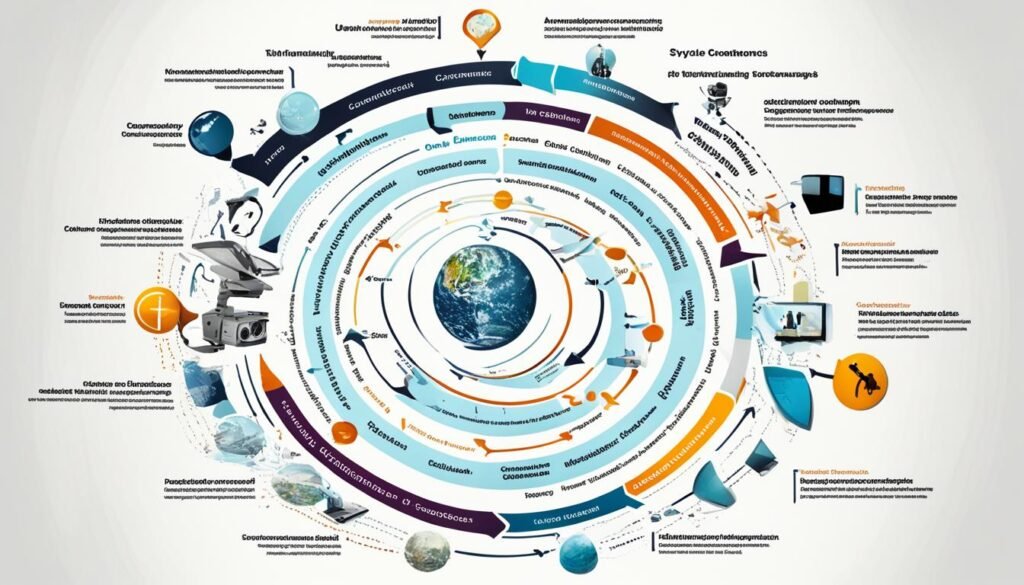When you hear “spy,” you might picture people doing secret missions. They collect hidden info or use cool gadgets against enemies. But, have you thought about spying being legal? Is there a thing as a “legal spy”? What can they do? Let’s discover the exciting world of spies and see what’s legal.
What is a Spy?
A spy is a person who gathers secrets for an intelligence group. They are also called agents or assets. Spies can be people who offer to help or are chosen because they know valuable things. They might do this for beliefs, love for their country, money, or other reasons. Unlike what many think, spies often don’t get special training. Instead, they use what they have and know to collect data.
Spies are crucial to secret operations. They blend into their surroundings to stay hidden. Their main job is to collect details and report back. Often known as agents, these individuals provide critical information to spy organizations, whether they mean to or not.
These individuals are vital for keeping countries safe. They inform about what others are doing, planning, and wanting. Spies are good at getting secret papers, listening in, or getting into places quietly. They’re masters at finding out secrets.
Technology is a big part of spying. Things like secret cameras, code-speaking gadgets, and small recorders are some tools spies use. These devices help them get and share secrets without revealing who they are.
Without spies, knowing what’s happening in politics, military plans, and safety threats would be hard. They work out of sight, gathering important info. This information helps make big decisions and protect people.
Characteristics of a Spy
Spies have special traits and skills that make them good at their jobs. Here are some key features of a spy:
- Subterfuge: Spies are good at lying and hiding who they really are and what they want.
- Adaptability: They can quickly get used to new places and pretend to be different people.
- Observation: Spies notice small details and gather data by watching closely.
- Intelligence: They are very smart and good at solving problems.
- Communication: Spies know how to secretly share messages without getting caught.
- Stealth: They are very careful to not get spotted by those they are spying on.
| Role | Description |
|---|---|
| Agent | Individuals who collect and provide information to intelligence agencies. |
| Asset | People who possess access to valuable information and willingly or unknowingly provide it to intelligence agencies. |
What is a Double Agent?
A double agent is someone who works for two opposing sides. This person is loyal to one side but then starts helping the other. This switch is risky as they must keep up appearances while gathering important information.
Double agents could be trusted members who choose to change sides. Or, they might be forced to work against their will. They join intelligence agencies, military forces, or criminal groups to provide key information.
Double agents are skilled in winning trust from both parties. They must act convincingly, adapt quickly, and think fast. This makes them very valuable.
In other fields outside intelligence, the term “double agent” applies too. It’s about people pretending to serve one group while actually helping another. This happens in law enforcement, politics, and business espionage. They use their roles to gain information for personal benefit or to hurt opponents.
Being a double agent comes with big risks. Getting caught might lead to jail, torture, or death. They must always be careful to keep up their act and stay useful.
Examples of Notorious Double Agents
Many famous double agents have made the news for their bold actions. Here are some:
- Kim Philby – A British intelligence officer who spied for the Soviet Union during the Cold War. He was a top MI6 member but secretly gave information to the KGB.
- Aldrich Ames – An American CIA officer who betrayed his country by working for the Soviet Union and Russia. His actions harmed many operations and led to the death of several agents.
- Oleg Gordievsky – A KGB officer who secretly worked for Britain’s MI6. Gordievsky’s work provided crucial insights into Soviet plans and helped avoid a possible nuclear conflict.
Double Agent Infographic
| Aspect | Description |
|---|---|
| Loyalty | A double agent is initially loyal to one side but becomes a spy for the opposing side. |
| Risks | Double agents face severe risks, including imprisonment or death if their true identity is discovered. |
| Skills | Double agents require exceptional acting skills, adaptability, and quick thinking to navigate their dual role. |
| Double Allegiance | Some double agents operate without changing their loyalties, pretending to work for one side while secretly assisting another. |
What is the difference between a detective and a spy?
Detectors and spies both deal with secrets but work in different ways. Detectives, or investigators, are part of law enforcement. They solve crimes by finding clues. Spies, or intelligence officers, collect secret information. They work in the shadows for national security.
Detectives use their skills at crime scenes and with witnesses. They work with forensic experts to solve crimes. Their work is open and helps keep us safe. They follow rules to ensure justice is served in criminal cases.
Spies, meanwhile, gather intelligence secretly. They focus on threats from other countries or groups, not common criminals. They get classified information to protect us from threats.
Detectives solve crimes and spies gather intelligence; their methods and goals are different. Detectives work with police to fight crime. Spies work hidden to protect our country. Both help make decisions in defense and intelligence.
Both detectives and spies need to be smart and adapt to change. They might work differently, but they both aim to protect society. Whether solving mysteries or spying, they work for our safety and order.
What is intelligence?
In the spy world, intelligence is key to making decisions on national security. But what does “intelligence” really mean?
Basically, intelligence is knowing and using knowledge and skills. In spying, it’s about the info that agencies gather to understand threats.
Intelligence includes different things, like:
- Information from people, such as officers and informants.
- Tools and methods for secret data collection.
- Data from open sources, including public info and media.
Agencies collect and analyze this data. They gain insights to predict and understand threats.
Gathering intelligence is a detailed task. It includes planning, collecting, processing, analyzing, and sharing the information.
As technology grows and threats change, intelligence also evolves. Agencies work on new ways to gather and analyze data. They protect national security and help leaders stay ahead.
The Importance of Intelligence
Intelligence is vital for decision-making in national security. It gives insights into threats, helping to prevent and stop enemy plans.
It shows us vulnerabilities, so we can protect ourselves better. Intelligence is key in stopping terror attacks, fighting cyber threats, and guarding infrastructures.
It also helps countries work together against common dangers. Sharing intelligence strengthens alliances and defense.
Intelligence isn’t just for the government. Businesses, police, and others rely on it too. It helps them make smart decisions.
At its heart, intelligence keeps us safe. It gives the knowledge and analysis needed to guard lives and interests.
What is counterintelligence?
Counterintelligence is key in protecting national security. It includes actions aimed at stopping spies from getting sensitive info. It also keeps secrets safe from enemy intelligence and spies.
Its main goal is to shield against spying and data collection by foes. It acts as the defensive part of intelligence, fighting enemy agents and groups.
Counterintelligence teams use different methods to find, stop, and mess up threats. These methods are:
- Creating plans to oppose foreign intelligence efforts
- Running operations against spies to find and stop them
- Setting up security rules to keep classified info safe
- Investigating possible spying
- Watching communications for signs of breaches
- Working with other local and global intelligence agencies
This focus helps governments and groups lower the risk of spying. It ensures their important info stays secure.
Importance of Counterintelligence
Counterintelligence is a vital defense against intelligence threats. It’s crucial for national safety and shields crucial data and military plans. It also protects diplomatic talks.
These efforts also block attacks on critical systems and economic spying. They keep the nation and its people safe.
Counterintelligence pros are key in staying safe. They adjust to new enemy methods and tech, protecting their countries.
| Counterintelligence Tactics | Description |
|---|---|
| Counter Surveillance | It spots and tracks possible spying. This includes watching, listening to communications, and secret ops. |
| Deception Operations | These tricks mislead enemy spies. They use fake agents, wrong info, and false campaigns. |
| Insider Threat Mitigation | It stops insiders from stealing and sharing secrets with outsiders. |
| Security Awareness Training | It teaches staff about threats. They learn to spot and report anything odd. |
| Cyber Defense | It’s focused on guarding against online risks. This includes insider threats, hacking, and information battles. |
What is the intelligence cycle?

The intelligence cycle is a process that spy agencies use to collect and analyze information. They then deliver important insights to those who make decisions. It involves key steps that ensure intelligence is gathered and used effectively.
Stages of the Intelligence Cycle
The intelligence cycle involves the following stages:
- Planning: Here, agencies decide what information they need. This helps them to better address national security.
- Collection: With the needs clear, agencies start collecting data. They use people, technology, and public sources to get information.
- Processing: In this step, agencies go through the information. They organize it, check its reliability, and ready it for deeper analysis.
- Analysis: This is where raw data becomes valuable intelligence. Analysts look for patterns and connections to draw meaningful conclusions. They often work with experts to understand the data fully.
- Dissemination: The last step is sharing intelligence with decision-makers. The goal is to deliver it in a way that is clear and useful for making important decisions.
This cycle is always moving, changing as new information comes in and needs evolve. When done right, the intelligence cycle helps spy agencies protect us by staying ahead of threats.
| Stage | Description |
|---|---|
| Planning | Identification of intelligence requirements |
| Collection | Gathering information from various sources |
| Processing | Analyzing and organizing collected information |
| Analysis | Deriving insights and conclusions from the processed data |
| Dissemination | Delivery of intelligence to decision-makers |
What is espionage?
Espionage, or spying, is gathering secret info using spies and agents. It’s done secretly and sometimes illegally. In military, politics, and business, espionage is key. It helps shape decisions with important information. But, in many places, it’s a serious crime.
States often use espionage to get intelligence from rivals. They infiltrate, watch, and use tactics to get classified info. This intelligence is for military, political, or economic gain.
To dive into espionage, we look at why secret information is collected. The goal is often to understand the plans and strengths of others. This secret info helps governments and agencies make plans.
Methods of Espionage
Espionage uses many covert methods. Agencies use humans, tech, watching, and public info to meet their goals.
In human intelligence (HUMINT), operatives connect with people who have valuable information. These could be agents, informants, or insiders.
Technical intelligence (TECHINT) uses technology and watching techniques. This includes spying on communications and safeguarding areas with spyware detection.
Signals intelligence (SIGINT) is about getting and decoding electronic signals. This can be radio messages or online chats, to gather intel.
Open-source intelligence (OSINT) collects info from public sources. This can be the internet, newspapers, and public records.
Methods of Espionage
| Method | Description |
|---|---|
| Human Intelligence (HUMINT) | Gathering intelligence through relationships with individuals possessing valuable information |
| Technical Intelligence (TECHINT) | Utilizing advanced technology and surveillance methods for information collection |
| Signals Intelligence (SIGINT) | Intercepting and decrypting electronic signals to gather intelligence |
| Open-Source Intelligence (OSINT) | Gathering information from publicly available sources |
How do spies collect intelligence?
Spies use many ways to get secret information. The first way is human intelligence, known as HUMINT. This means they find and use other spies or sources to get information. These agents get key insights from their contacts and access to secret places.
Another key way is through technical intelligence, or TECHINT. This uses modern tech and sneaky surveillance methods. They intercept messages, put up hidden cameras, or even use covert aerial surveillance for important details secretly.
Signals intelligence, or SIGINT, is also a method where spies intercept electronic communications. Using advanced technology, they gather data from calls, emails, and online chats.
Then, there’s open-source intelligence (OSINT). This is about collecting info from public sources. Things like online sites, newspapers, and public records are used. By examining this data, spies understand what their targets are doing and why.


